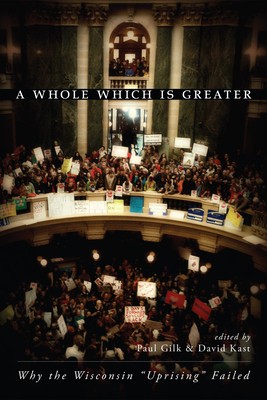
- We will send in 10–14 business days.
- Publisher: Wipf & Stock Publishers
- Year: 2012
- Pages: 276
- ISBN-10: 1498265359
- ISBN-13: 9781498265355
- Format: 15.2 x 22.9 x 1.8 cm, hardcover
- Language: English
- SAVE -10% with code: EXTRA
A Whole Which Is Greater (e-book) (used book) | bookbook.eu
Reviews
Description
Description: In November 2010, Republican Scott Walker was elected Governor of Wisconsin. In something of a Tea Party sweep, the iconic Russ Feingold lost his seat in the U.S. Senate and the Wisconsin legislature became Republican in both chambers. In early 2011, Governor Walker announced a ""budget repair bill"" that, among other things, gutted collective bargaining rights for most public sector unions. Outraged citizens occupied the state capitol for weeks in an outpouring of opposition, the likes of which had not been seen in Wisconsin since the protests against the war in Vietnam in the 1960s. Various recall elections were held in the summer of 2011 (all in regard to the state senate), with another set of elections in June 2012; among them the governor's recall was paramount. Democrats regained control of the senate, but Scott Walker defeated Milwaukee mayor Tom Barrett and kept the governor's mansion. Many Democrats were stunned by the failed recall. These essays probe that failure. Every contributor has a unique perspective, but lurking near the core of that probing are two key issues: the extent to which corporations have taken over government and whether ecological crises are revealing conventional politics as complicit in disaster. About the Contributor(s): Paul Gilk grew up on a small farm. He lives in the woods of northern Wisconsin with his wife, Susanna. He has several published books and also writes under the pseudonym Seedy Buckberry. David Kast is a retired mathematics teacher living with his wife in Wausau, Wisconsin. He was active in organizing protests against the Gulf Wars and has invited numerous speakers to northern Wisconsin.
EXTRA 10 % discount with code: EXTRA
The promotion ends in 13d.16:12:12
The discount code is valid when purchasing from 10 €. Discounts do not stack.
- Publisher: Wipf & Stock Publishers
- Year: 2012
- Pages: 276
- ISBN-10: 1498265359
- ISBN-13: 9781498265355
- Format: 15.2 x 22.9 x 1.8 cm, hardcover
- Language: English English
Description: In November 2010, Republican Scott Walker was elected Governor of Wisconsin. In something of a Tea Party sweep, the iconic Russ Feingold lost his seat in the U.S. Senate and the Wisconsin legislature became Republican in both chambers. In early 2011, Governor Walker announced a ""budget repair bill"" that, among other things, gutted collective bargaining rights for most public sector unions. Outraged citizens occupied the state capitol for weeks in an outpouring of opposition, the likes of which had not been seen in Wisconsin since the protests against the war in Vietnam in the 1960s. Various recall elections were held in the summer of 2011 (all in regard to the state senate), with another set of elections in June 2012; among them the governor's recall was paramount. Democrats regained control of the senate, but Scott Walker defeated Milwaukee mayor Tom Barrett and kept the governor's mansion. Many Democrats were stunned by the failed recall. These essays probe that failure. Every contributor has a unique perspective, but lurking near the core of that probing are two key issues: the extent to which corporations have taken over government and whether ecological crises are revealing conventional politics as complicit in disaster. About the Contributor(s): Paul Gilk grew up on a small farm. He lives in the woods of northern Wisconsin with his wife, Susanna. He has several published books and also writes under the pseudonym Seedy Buckberry. David Kast is a retired mathematics teacher living with his wife in Wausau, Wisconsin. He was active in organizing protests against the Gulf Wars and has invited numerous speakers to northern Wisconsin.


Reviews